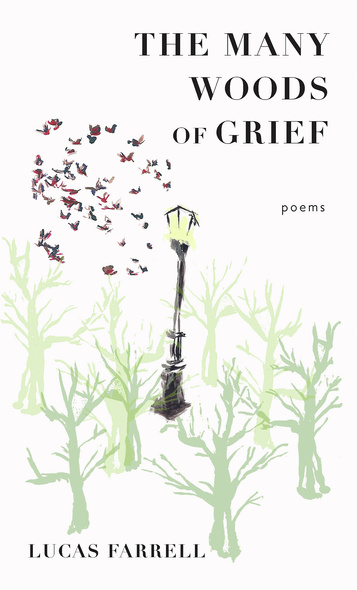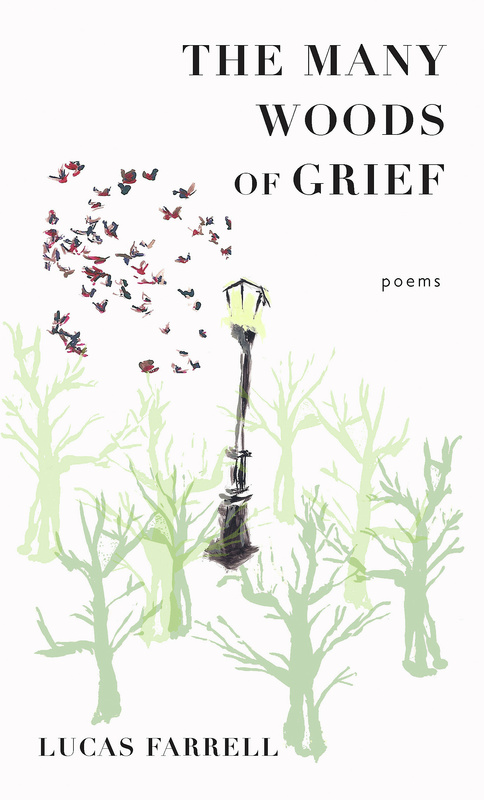Our shopping cart is currently down. To place an order, please contact our distributor, UTP Distribution, directly at utpbooks@utpress.utoronto.ca.
In this striking debut volume, Lucas Farrell offers a lyrical and illuminating field guide to the flora and fauna of "worlds just out of reach." With the precision and detail of an Audubon sketch, he turns his naturalist's eye to the vast landscape of human emotion—all the while affirming "how real this world we live in / must be to live in."
Journeying ever outward, from the achingly ordinary to the mysterious "land where there is no land," the narrator of this collection, equal parts pastoralist and surrealist, explores the vivid in-betweens—between love and loss, hilarity and despair, wild and domestic, real and imagined. Hungry, expressive, and original, these poems glean light from even the darkest of fields.From "Further Along Now"Further along the curves of gesture, the delicateapostrophe, in the tongues of muted suns, we'll findourselves in a clearing, in a meadow of ancient grass,picking apart what has long been picked apart. Furtheralong, the compliments, the tweezers and logic, thelaboratory of hard hats and felt pens and hard headsand clipboards hanging from sky's bloody fender, birddroppings steaming calligraphic so long as the cloudsbecome clouds become clouds and amazed we see insuch preventable warfare our own substancesunchanging. Fountains of ash too diffuse to interpret,too complex to diagnose, I quote the many woods ofgrief, too far alone, too deep.
Journeying ever outward, from the achingly ordinary to the mysterious "land where there is no land," the narrator of this collection, equal parts pastoralist and surrealist, explores the vivid in-betweens—between love and loss, hilarity and despair, wild and domestic, real and imagined. Hungry, expressive, and original, these poems glean light from even the darkest of fields.From "Further Along Now"Further along the curves of gesture, the delicateapostrophe, in the tongues of muted suns, we'll findourselves in a clearing, in a meadow of ancient grass,picking apart what has long been picked apart. Furtheralong, the compliments, the tweezers and logic, thelaboratory of hard hats and felt pens and hard headsand clipboards hanging from sky's bloody fender, birddroppings steaming calligraphic so long as the cloudsbecome clouds become clouds and amazed we see insuch preventable warfare our own substancesunchanging. Fountains of ash too diffuse to interpret,too complex to diagnose, I quote the many woods ofgrief, too far alone, too deep.
Lucas Farrell throws a spell over everything his voice touches. Crossing back and forth between zones of innocence and experience, he inhabits the child's vision and the ancient's: leaping, witnessing, scoffing, adoring and unsettling, searching everywhere for connection but consenting easily to nothing. One minute the poem is a parable, the next it's your very life—laboratory, meadow, matinee; a theater that feels alarmingly exact, where anything at any moment could fall from the sky or surface blindly from the depths. In an age where we abandon wonder and have lost our fear of loss, Farrell's poetry is testimony: loss is real, and everywhere around us. This book holds out the sad and gorgeous camaraderie of wanting-to-see—Joanna Klink, author of Raptus and Circadian
'The Many Woods of Grief, if I saw it on a hand lettered sign at the end of a dirt road, I would pause a while before impulsively and maybe recklessly entering those woods. It's not really like that in Lucas Farrell's book. One feels one is accompanied by a steady, generous and practical guide who points out what to linger over and what to leave behind. Poem after poem opens up, newly imagined, freshly encountered. When Farrell writes things such as: 'I think we make the scarecrows insecure,' I think he makes me love his poems more and more. Farrell's fearless and friendly, a fantastic combination.'—Dara Wier
''The bird fell from the sky. / Let me be clear: The bird.' We can see everything in these opening lines: a recombinant poetics, the literal re-marked as literal, a hunger for clarity, the imperative as plea. Not everything. 'Compose again. Hope tectonics.' Yes, everything.'—Christian Hawkey
'When I enter the woods of the many woods of grief I find myself lost. One must be lost in the woods, must learn to be lost. Not to be found, no. Lucas Farrell is no simple guide whose wisdom finds for others a path that may or may not exist. No, Farrell is that trickster wearing a guide's mask—who knows the woods have no center. Here in these woods innocence is a troubling, necessary mischief that re-orients the eye by disorienting the I. Where else but in a poem can the radical experiment of transcendentalism—where the distance between I and you and I and it confound and grow intimate—be reclaimed by growing ironic? These poems are of that deep irony in which the self is re-introduced to the world and the world shatters it. The result nears a kind of religious awakening, save this religion isn't dogma. It's the eye returning to the ceremony of sight, the voice to ceremony of singing, and the self to the ceremony of being in the glorious, ridiculous, difficult world.'—Dan Beachy-Quick
Lucas Farrell received his MFA in poetry from the University of Montana. His writing has appeared in Boston Review, Jubilat, Cannibal, Alice Blue, Handsome, DIAGRAM, and elsewhere. He coedits the online magazine Slope and lives in Townshend, Vermont.





